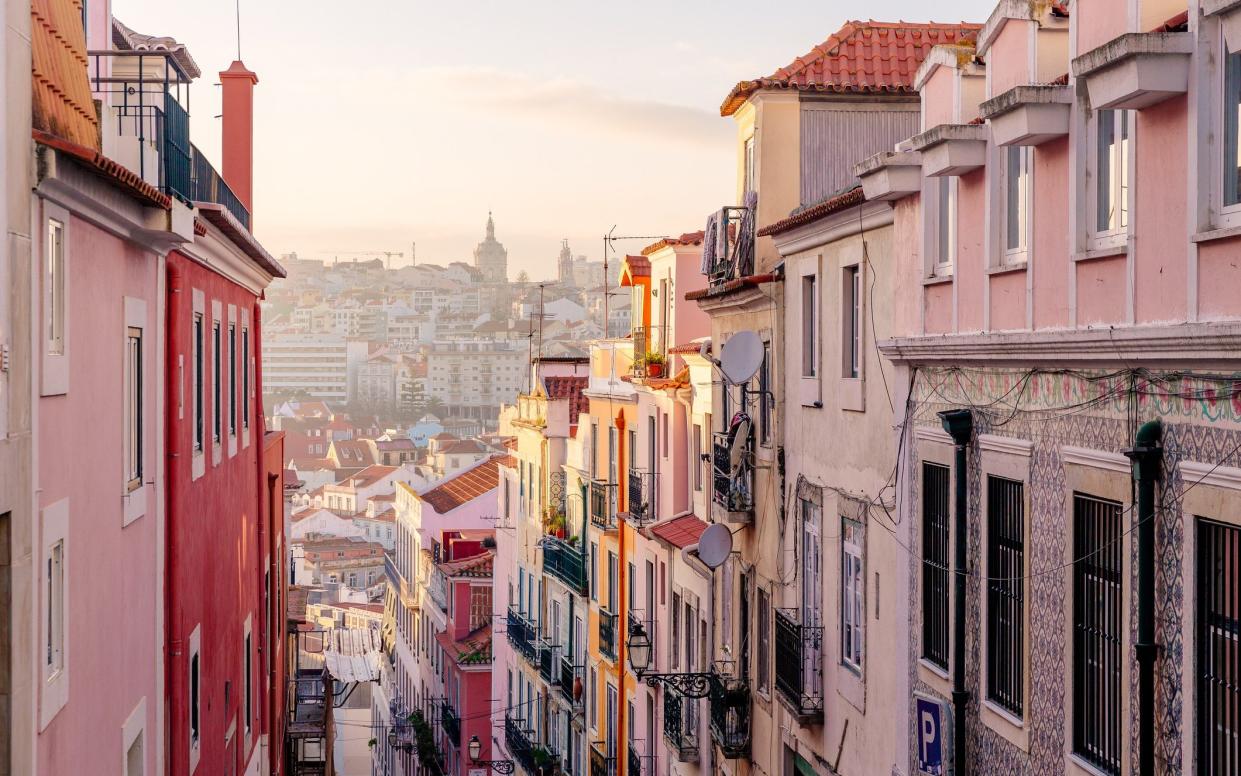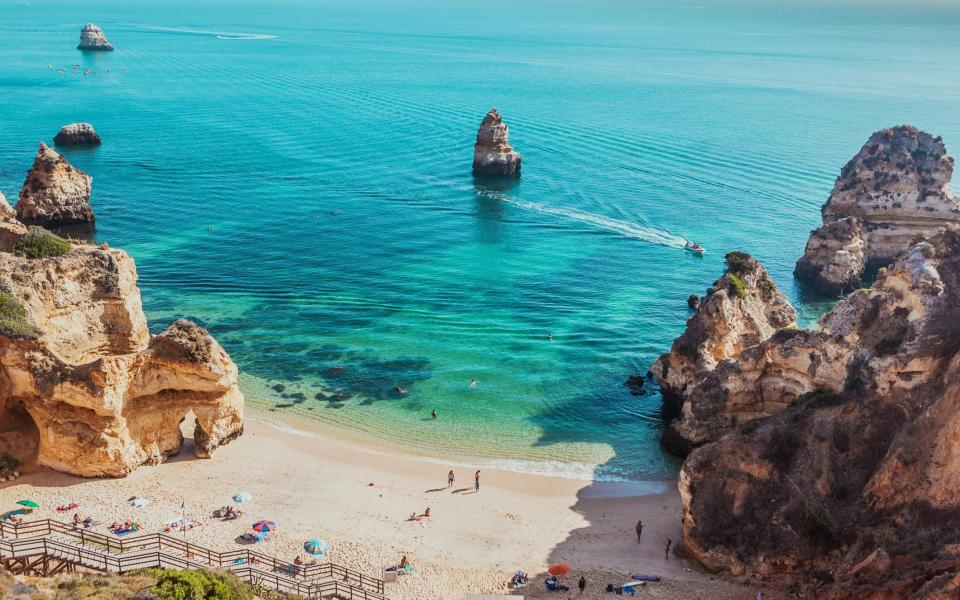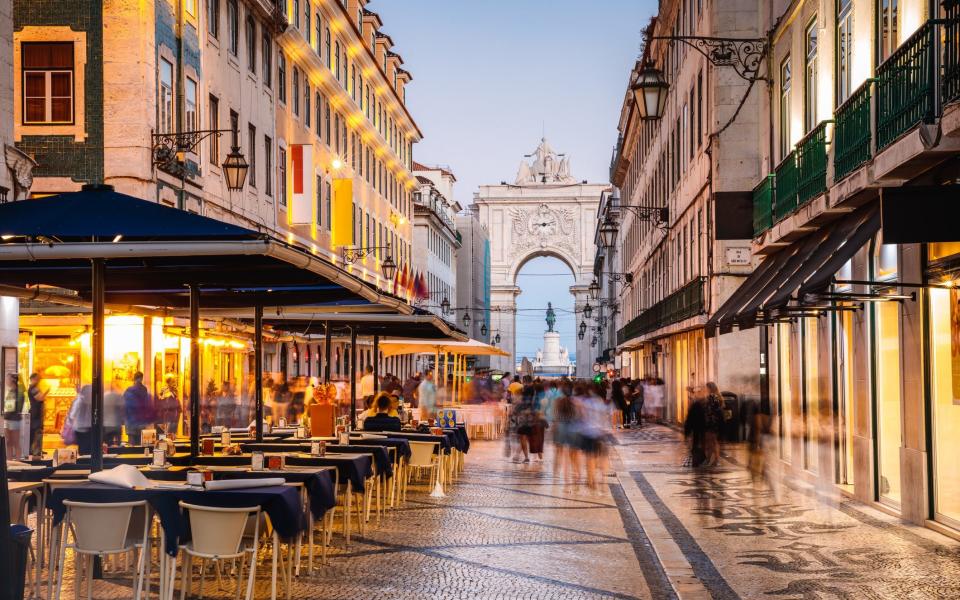Travel to Portugal: latest Covid rules and practical guidance once you are there

The Azores and Madeira are open for business, while on Portugal's mainland Lisbon’s downtown is back to its bustling pre-pandemic best. The streets are busy, restaurant terraces are full, events are scheduled, shops are open and beach days are still kicking on.
Portugal’s world-leading vaccination rollout has sent case numbers and particularly hospitalisations diving and allowed the country to gleefully loosen virus curbs from October 1. It’s not an England-style “freedom day”, but nightclubs reopen and capacity limits disappear along with masks in some instances.
Take note that Portugal’s two autonomous island regions, the Azores and Madeira, have different rules to the mainland. Here’s what you need to know when planning a holiday to Portugal.
Can I go to Portugal?
Yes. Portugal and its islands are categorised as low risk by the UK Government, meaning you can visit. The UK's previous green and amber lists has been merged into a singular 'Go' category. All other countries are on the red or 'No Go' list; arrivals from these countries will need to enter hotel quarantine on their return.
In addition, the Foreign Commonwealth and Development Office (FCDO) no longer advises against non-essential travel to Portugal – making it easier to obtain insurance.
Portugal is welcoming British arrivals, however there are some restrictions in place (see below).
As of September 2, unvaccinated travellers arriving in Portugal are no longer required to self-isolate. Instead, they must present a negative PCR test (taken within the 72 hours prior to departure) or an antigen test (within 48 hours). Vaccinated travellers are not required to take a test.
Do I need to take a test before travelling back to England?
It depends on your vaccination status. If you are fully vaccinated, you no longer need to take a pre-departure test 72 hours before arriving back in the UK. If you are not fully vaccinated, you must take a test (lateral flow are accepted) 72 hours before travelling home, using a Government-certified testing company. You can find the Government's rules on testing before departure, here.
Do I need to self isolate on my return to England?
If you are fully vaccinated, you do not need to self isolate on your return from Portugal (though you will need to take a PCR, or, from late October, a non-NHS lateral flow test) up to two days after arriving back in the UK. If you are not fully vaccinated, you will need to self isolate for 10 days when arriving from any country, taking a PCR test on day two, and another on day eight, with the option to 'test to release' on day five.
Do I need to do any paperwork before travelling back to England?
Yes. All passengers must fill in a Passenger Locator Form before arrival back to England, including your reference code for your day two test. You can do so, here.
Are flights operating?
Direct flights between the UK and Portugal are currently operating. Jet2, Ryanair, British Airways and easyJet are among the airlines currently flying to Portugal.
Will I be insured if I go?
The Foreign Commonwealth and Development Office (FCDO) no longer advises against non-essential travel to Portugal – making insurance policies easier to come by.
Do I need to take a test before travel to Portugal?
Yes, if you are unvaccinated and visiting mainland Portugal. The Foreign Office website explains: "You will need to take a Covid-19 test to enter Portugal (children up to the age of 11 are exempt), this can be an RT-PCR test taken within 72 hours of departure, or an antigen test taken within 48 hours of departure."
Double-jabbed travellers also need to test to visit the mainland or the Azores – only travellers with an EU Digital Covid Certificate do not. The NHS app is not yet approved as proof of vaccination in Portugal or the Azores.
However, according to the FCDO, if you are visiting Madeira are fully vaccinated you do not need to take a test as the NHS app is accepted – those who are yet to be double-jabbed must take an RT-PCR test 72 hours before departure instead.
Do I need to fill in any forms?
Yes, all arrivals must fill in a passenger locator form, including proof of their negative test result or vaccination status.

Do I need to self-isolate on arrival?
No, you do not need to quarantine if you can provide proof of a negative test or vaccination.
Essential tick-list: What do I need to travel to Portugal?
Make sure you have the right paperwork and documents for your trip:
Before travelling, you will need:
Proof of your double vaccination status. Or, certificate of negative PCR test taken in the 72 hours preceding entry or an antigen test taken within 48 hours of departure. Or proof you have recovered from Covid no less than 11 days and no more than 180 days of when you are due to travel.
Completed online passenger locator card.
Any additional non-Covid related visa/entry documents.
On arrival, you will:
Be subject to health screening on arrival. If your temperature is 38ºC or over or you show signs of being unwell, you may be required to take a Covid test and remain at the airport until you receive your test result.
You may also be asked to show your negative Covid test result and/or your vaccination certificate at border control.
To return to the UK, you will need:
To take a lateral flow (fully vaccinated) or PCR test (if you are not vaccinated) within 48 hours of arriving back in the UK. You can find a full list of Government accredited companies here.
A completed passenger locator form.
If not fully vaccinated, you will need to take a pre-departure test, taken 72 hours before returning, and show a certificate before boarding your flight home.
Exemptions may apply, and rules may vary for children. See the full FCDO travel requirements here.
Do I need to wear a mask?
Yes and no. Masks will remain mandatory on public transport, at concert and event spaces and cinemas, in large commercial spaces and on flights. But from October 1 they will no longer be required in small local shops, restaurants, gyms, bars and nightclubs.
Culturally, expect to still see many Portuguese choosing to wear a mask.
Is there a curfew in place?
Madeira has a curfew from 2am until 5am.
What are the rules on beaches?
At the beach you will need to maintain a distance of 1.5 metres from others. Beach umbrellas need to be 3 metres apart and sports involving two or more people are banned on busy beaches, unless it is a nautical activity.
Portugal uses a traffic light system, which you can check online at InfoPraia (in English) or download the app, to measure how busy beaches are.
What are the rules for restaurants?
From October 1, capacity restrictions in restaurants and cafes in mainland Portugal will be dropped along with the requirement to wear a mask and show an EU Digital Covid Certificate to enter on weekends.
In Madeira, restaurants, bars and cafés can stay open until 1am with two-thirds capacity. Tables inside can seat up to six people, while outside on a terrace you can be 10. You can only drink while seated.
In the Azores cafés can seat up to 10 people and be three-quarters full.

What are the rules in bars and nightclubs?
The government promised bars and nightclubs could reopen once Portugal hit the 85 per cent vaccination target. Shuttered since March 2020, nightlife in Portugal restarted again on October 1. To enter you’ll need to show a vaccination certificate proving you have been vaccinated, recently recovered from Covid-19 or tested negative (in the past 72 hours for a PCR test or 48 hours for lateral flow).
Since October 1, drinking alcohol on the street and in public places has been legal again (not that this temporary rule was being strictly enforced).
What are the rules for shopping?
High street stores and shopping centres are open as usual across the country. Masks are mandatory inside large commercial spaces but not small stores and local shops. There are no restrictions on hours or capacity.
What are the rules in hotels?
In hotels, guest houses and other accommodation, mask-wearing has not been mandatory since October 1.
What are the rules on public transport?
If you want to ride the bus, train, ferry or tram, wearing a mask is mandatory. Try to carry small change or acquire a transit card – like the Viva in Lisbon – as some modes of transport will not give change or accept cash or card.
Shall I take cash, or pay for everything on card?
Definitely take cash. Since the pandemic, more small businesses have started accepting cards, but Portugal has a unique banking system and many restaurants, shops and bars will only accept the local card or cash.
Can I play golf?
Yes, golf courses are operating as normal.
Can I visit a museum or attend an event?
Cultural spaces, concerts and events have been able to run with full capacity from October 1. Outdoor events are back and small events and festivals have returned. To attend an outdoor event with more than 1000 people or an indoor event with more than 500 people you will need to show a negative test or EU Digital Covid Certificate (vaccine passport).
In the Azores and Madeira, events have returned too. In the Azores, events can have three-quarter capacity. In Madeira, cultural spaces can reach two-thirds capacity and any event with more than 100 people will require rapid antigen tests taken up to 48 hours ahead.
How is the case rate in Portugal?
As of October 7, Portugal's seven-day case rate per 100,000 is 39.1, compared to the UK’s 402.7.
How is Portugal's vaccination drive going?
Portugal is leading the world with the highest percentage of people fully vaccinated against Covid-19. As of October 7, 97.9 per cent of the population has been double-jabbed.
Reader Service: Do you know what medical conditions you need to declare when you buy travel insurance? Discover more about the Telegraph Media Group Travel Insurance Service.

